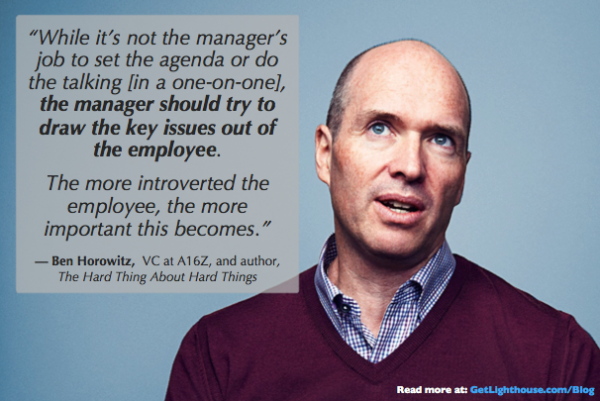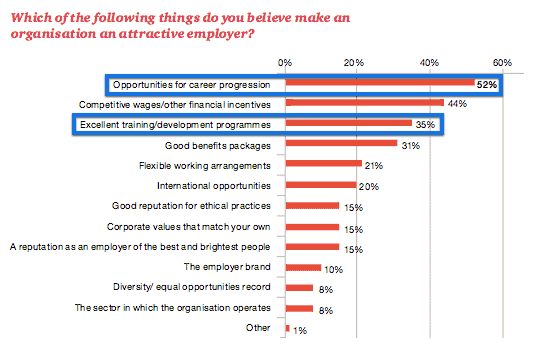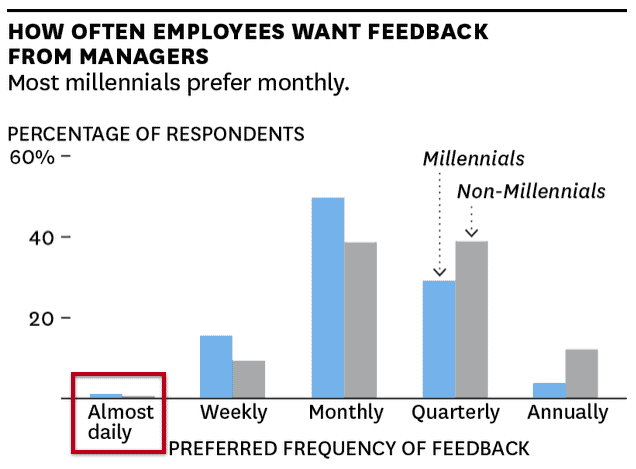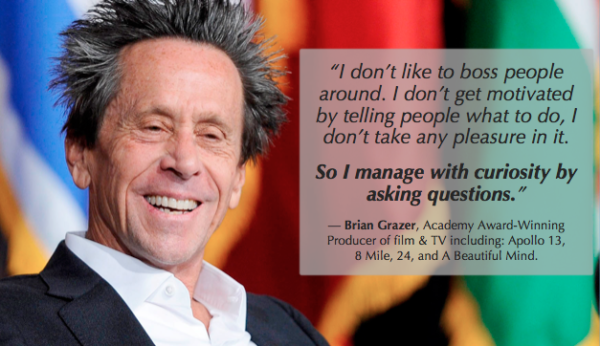Ever had a great manager that invested time in helping you grow and develop? It felt great to have a coach at work, didn't it?
If not, chances are you taught yourself how to get better– whether that was your skills to be a great individual contributor or how to be a manager– through trial and error and self-directed learning (like a reading habit).
Now, as a manager, it may be tempting to leave your team to do the same. However, that would be a big mistake.

Being a good coach is an essential skill for managers today for a variety of reasons:
- It's the #1 perk that employees want, even more than flexibility or a bonus.
- During a time of layoffs, hiring freezes, and budget cuts, it's one of the highest impact things you can do to get the best from your team.
- Good coaching helps your team members avoid mistakes that can cost you customers, lead to lost revenue, or make ship dates slip.
It also builds an intense loyalty, boosting your retention, as employees appreciate being coached.
Yet, wanting to be a good coach, and actually being a good coach are two very different things.

How can I help my team grow?
If you've never had the kind of manager that took the time to help you grow and develop your professional skills, like a great coach would, you might not know how to help your own team grow now that you're a manager.
The most important step is to start having regular 1 on 1s with everyone on your team. Those 1 on 1 meetings will serve as the foundation for everything from:
- Gathering information about them that helps you understand how to best help them
- Building rapport so that they trust you, which allows you to…
- Offer feedback they can use to develop themselves
Don't wait for performance reviews to offer feedback and give them advice on where or how they can improve. That just builds resentment, and waits too long to make progress.
The Power of 1 on 1s
Instead, use your regular 1 on 1s with your team members as your primary place to coach. There, you can offer feedback in a private setting where you're both focused exclusively on them.
A 1 on 1 also gives you plenty of time to dig into a topic, talk through examples, and make sure they understand what you're trying to teach them.
Once you have those regular 1 on 1s set up, you might be wondering where or how to start coaching them. That's where the right questions come in.
By asking good questions, which you can add to your 1 on 1 agenda, you can set yourself up to be a great coach.
The right coaching questions will help you learn what they want and need to develop, their goals, what frustrates them, and what works best for them in terms of how they learn. Then, you can apply that to becoming a better coach.

12 Questions to Ask Your Team to Become a Better Coach at Work
In our guide on why today's managers must become coaches (and how you can do it), we talked about three ways to coach your team:
- Focus on their growth
- Motivate each person uniquely
- And give regular feedback & praise
Ed Note: There's a lot more to learning how to become a great coach to your team, so to learn more, read our guide on why managers must become coaches here.
The questions below will help you start planting seeds and gathering information that will help you in each of these areas, including:
- Finding out what skills or areas they need and want to develop most
- Discovering what makes them tick so you know how to motivate them more effectively
- Learning more about how they prefer to receive feedback so you can give in a way they'll be most receptive
Here are 12 questions to ask your team to become a better coach, organized by how they help you.
Table of contents:
- 12 Questions to Ask Your Team to Become a Better Coach
- Additional resources

Coaching Questions: On Professional Growth
The best place to start is to first find out what they want to work on. What skills do they want to develop? Where do they want to go career-wise?
Your Millennials especially will appreciate you for it, as this report by consulting firm PwC reveals. Both career advancement and developing new skills were rated as the most attractive factors of an employer:

While you might already have a good idea of what areas they need to work on, you might not know what they want to work on or what their goals are. By asking them, you can work to make sure you're in agreement, and uncover weaknesses you may not see yet, but they do.
That's where questions like these can be useful:
- 1) "What's 1 thing you'd like coaching from me on?”
- 2) "What skills would you like to work on?”
- 3) "What area of your job do you want to work on your confidence?”
Once you know what they want to work on, it's also important to make sure they feel confident with their skills:
- 4) "Do you ever feel imposter syndrome? When does it happen?”
Imposter syndrome is often related to a lack of confidence in a set of skills. They may already be great at that particular skill, but that doesn't necessarily mean they believe it.
You can help them become more confident by praising good work in areas they lack confidence, and giving coaching and feedback so they get better and more confident in that area.
As their manager, your opinion matters to them, so put it to good use to help them eliminate feelings of imposter syndrome.
For more on providing growth and development for your team members read:
- How to help your team achieve their goals
- How to provide employee development when you can't promote them
- The 3 questions managers struggle with most in helping their team members with their career development plans
- And if you're a senior leader, here's The best professional development goals for managers

Coaching Questions: On Giving Effective Feedback
A big part of being a great coach is the ability to give effective feedback.
One of the biggest mistakes managers and organizations as a whole make is only giving feedback to employees during annual performance reviews.
That's far too infrequent to have a real impact. It also can lead to resentment as your team will be very upset if the first time they hear about something they can improve is when their compensation is affected.
Knowing this, it's little surprise that a recent study by Adobe found:
"More than half (55 percent) of office workers and 66 percent of managers wish that their companies would get rid of or change the current performance review process.”
Yet, you have to be careful throwing the baby out with the bath water; swinging in the complete opposite direction with real-time feedback is just as bad.
It's hard to build that level of new habit, thinking to give feedback instantly. Most importantly, you can't give the most effective feedback right when it happens as it leaves no time for thoughtfulness, reflection, and a detailed discussion about it.
That's why you need to find the happy medium of giving feedback regularly in your 1 on 1s, which should happen every 1-4 weeks.
This aligns perfectly with research that shows that Millennials don't want annual or real-time feedback. Instead, most want monthly feedback, as this study by Success Factors found:

How do they want to receive feedback?
While the above is a good general guideline, it's important to find out what each of your team members prefers in terms of how and when they receive feedback.
To find out both the approach and timing of giving feedback, you can ask questions like these from Lara Hogan, author of Resilient Management and former engineering leader at tech companies like Etsy and Kickstarter:
- 5) "How do you like feedback? (The medium: chat message, email, in person, etc.)”
- 6) "How do you like feedback (The routine: in 1:1s, as-it-happens, etc.)”
These questions are important to ask, as Hogan reminds us:
"Few things are harder than trying to give someone feedback; doing it in a way that you think they'll be most able to hear it is invaluable.”
The ability to give effective feedback, in a medium and at a time that they'll be most receptive to it, is key to being a good coach. By asking questions like these, you can uncover clues about how to offer feedback to them in a way that will maximize your impact.

Praising is coaching, too!
Remember that it's not just about giving feedback, it's also about giving effective praise.
That's why Hogan also recommends asking this question to pair with asking about giving your team feedback:
- 7) "How do you prefer to receive recognition? (Public or private)”
Some people bask in the glow of having others hear that they did a great job. For those people, a team meeting or a public comment in chat is a great way for them to feel the love.
On the other hand, there are also people who feel deeply uncomfortable with public praise. It literally makes them squirm in their seat. For them, they'll be much more appreciative if you deliver your praise in private just for them.
You won't know who on your team prefers which one unless you ask. For those that prefer it in private, they'll particularly appreciate you asking before they are put in an uncomfortable situation.
No matter how your team members prefer their praise, realize that it is powerful to let them know that you believe in them.
In some cases, it doesn't even have to be a particular special message. As NFL coaching great Bill Walsh explains in "The Score Takes Care of Itself”:
"You need to stretch people to help them achieve their full potential…the most powerful way to do this is by having the courage to say, ‘I believe in you.'
These four words constitute the most inspirational message a leader can convey.”
Remember: as their manager, your team values your input and what you think of them. At the least, they know your opinion helps determine their career prospects and compensation.
However, if you also work to be a great manager, they'll also value your thoughts on their work, because they appreciate you as a leader, and know you have their best interests at heart. Start building that trust by asking these kinds of questions to know what kind of feedback and praise they want.
For more on how to give effective feedback and praise in a variety of ways, read:
- 5 Awesome Ways to Give Feedback to Your Team
- How to Give Constructive Feedback to Motivate and Improve Your Team
- Why Real-Time Feedback is a Terrible Idea for Your Company (+ what to do instead)
- The Ultimate Workplace Praise Guide: 21 Ways to be more positive and give effective praise to your team

Coaching Questions: On What Works Best for Them
Each person on your team is unique. They will respond differently to various kinds of feedback, approaches to learning, and have different ideal environments. To be the best possible coach, you need to offer some flexibility to your team members to meet their unique needs.
As legendary UCLA basketball coach John Wooden put it in his autobiography, Wooden:
"You must be interested in finding the best way, not in having your own way.”
It's not about how you want to teach or develop your team; rather, it's about what works best for them. And the only way to find out what works for them is by asking the right questions.
Questions like:
- 8) "How do you learn best? What medium, format, or approach?”
Some of your people might love reading books or blog posts, others will prefer video or some kind of visual or hands-on learning. Find out what style and medium resonates with them and make a note of it.
As important as the type of learning that works best for them is timing. Ask them questions about when they learn, too:
- 9) "When do you like to work on developing new skills? Do you have a routine for it?”
- 10) "When do you typically read?”
Habit building is powerful. You'll level up more if you schedule one hour a week every Friday doing something than if you randomly try to find the time when you think of it.
Questions like this also then give you as their manager a chance to know:
- A) When to send them something (so they can use it next time they're learning), and
- B) When to check back in to see how a learning session went.
By understanding when they'll be making progress you can go from being that annoying, nagging manager that "checks up on me to much" to the helpful manager that "knows just went to circle back as I finish another learning session."
Here are some more questions to help you figure out what works best for them:
- 11) "Who was your favorite coach or manager you ever had? What did you like about how they worked with you?”
- 12) "What frustrates you or makes it much harder for you to learn?” (Learn what to avoid.)
You may be surprised what you hear from your team when you ask these last two questions; they're advanced tactics that few employees have ever had a manager that cared enough to ask.
While caught off guard, they'll be excited to know they have a manager that cares this much to ask. That's how you build loyalty that leads to long term, healthy relationships and team members that want to work hard for you.
For more on questions you can ask to get to know your team and build a healthy relationship from the start,
- 6 Questions you must ask when you start managing a new team
- One on one meeting questions great managers ask their team
- And we have a variety of specialty questions for a variety of managing and coaching situations including: questions for remote employees, skip level 1 on 1 questions, questions about managing managers, crisis leadership questions, and to better manage up.

Questions are a tool of great coaches
With the right questions in hand, you can uncover key insights that help you be a better coach to your team.
You can find out:
- Their professional development goals
- How and when they learn best
- The most effective way to give them feedback and praise
Use these and any other questions you come up with to learn how you can make the time you spend coaching your team members as productive and effective as possible.
Also - remember to set a good example and continue your learning.
Take some time to dive into some of our other coaching-related resources to learn more about what goes into becoming a great coach to your team:
- Why Today's Managers must Become Coaches (and how you can do it)
- How to Give Constructive Feedback to Motivate and Improve Your Team
- 5 Key Bill Walsh Quotes on Leadership from The Score Takes Care of Itself
- 7 John Wooden Quotes on Leadership to Make You a Better Manager
- Red Auerbach's Leadership Secret to Winning 9 titles in 11 Years
Do you have a culture of great leadership?
Do your managers have the skills and habits you want them to? Lighthouse Lessons helps your leaders learn essential skills, and reinforce your in person training programs with our bite-size email based programs.
Build a culture of coaching and great leadership like Textron has by learning more and signing up here.






